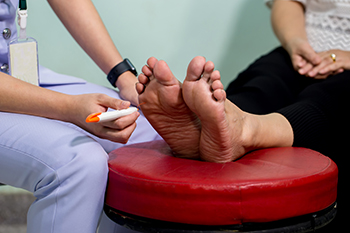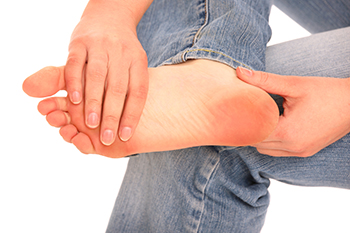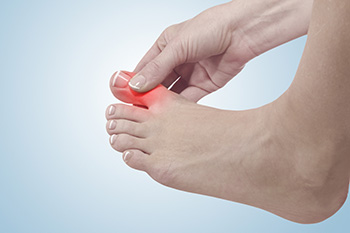
During a woman’s pregnancy, she might experience several different important changes to her feet. For example, the increased weight gained from bearing a growing child can put extra strain on the feet, sometimes causing foot pain. There are several steps that a pregnant woman could consider taking to mitigate her increased foot pain. First, a pregnant woman might drink a good deal of water. Doing this will help reduce the amount of salt in the body, consequently minimizing inflammation in the feet. Also, a pregnant woman could apply ice to the feet if the ankles become exceedingly swollen. Applying ice in short increments to the feet can help bring down the swelling. Lastly, a pregnant woman can make an appointment with a podiatrist to help treat any pain in the feet that she is experiencing. To learn more about mitigating foot pain during pregnancy, make an appointment with a podiatrist today.
Pregnant women with swollen feet can be treated with a variety of different methods that are readily available. For more information about other cures for swollen feet during pregnancy, consult with Dr. Richard DiMario from Maine. Our doctor will attend to all of your foot and ankle needs.
What Foot Problems Can Arise During Pregnancy?
One problem that can occur is overpronation, which occurs when the arch of the foot flattens and tends to roll inward. This can cause pain and discomfort in your heels while you’re walking or even just standing up, trying to support your baby.
Another problem is edema, or swelling in the extremities. This often affects the feet during pregnancy but tends to occur in the later stages.
How Can I Keep My Feet Healthy During Pregnancy?
If you have any questions please feel free to contact our office located in York, ME . We offer the newest diagnostic and treatment technologies for all your foot and ankle needs.

When the nerves that transmit messages from the brain to the feet are damaged, the result is a condition known as peripheral neuropathy. The main symptom is numbness, along with tingling, a burning sensation, and sometimes a sharp shooting pain. Among the many causes of peripheral neuropathy, diabetes is at the top of the list. About half of diabetics develop this condition, which is caused by chronic high blood sugar levels. Because of the numbness, diabetics may not notice sores or cuts on their feet that can become ulcerated. Side effects from medication you may be taking is another well-known cause of peripheral neuropathy. Other causes include genetics, inflammatory infection, autoimmune disease, and kidney disease. Excessive drinking of alcoholic beverages is another common cause. Ignoring symptoms of peripheral neuropathy can be dangerous to your health. If your feet feel numb on a regular basis, it is wise to seek the counsel of a podiatrist as soon as possible for a full examination and an ongoing program of treatment.
Neuropathy
Neuropathy can be a potentially serious condition, especially if it is left undiagnosed. If you have any concerns that you may be experiencing nerve loss in your feet, consult with Dr. Richard DiMario from Maine. Our doctor will assess your condition and provide you with quality foot and ankle treatment for neuropathy.
What Is Neuropathy?
Neuropathy is a condition that leads to damage to the nerves in the body. Peripheral neuropathy, or neuropathy that affects your peripheral nervous system, usually occurs in the feet. Neuropathy can be triggered by a number of different causes. Such causes include diabetes, infections, cancers, disorders, and toxic substances.
Symptoms of Neuropathy Include:
Those with diabetes are at serious risk due to being unable to feel an ulcer on their feet. Diabetics usually also suffer from poor blood circulation. This can lead to the wound not healing, infections occurring, and the limb may have to be amputated.
Treatment
To treat neuropathy in the foot, podiatrists will first diagnose the cause of the neuropathy. Figuring out the underlying cause of the neuropathy will allow the podiatrist to prescribe the best treatment, whether it be caused by diabetes, toxic substance exposure, infection, etc. If the nerve has not died, then it’s possible that sensation may be able to return to the foot.
Pain medication may be issued for pain. Electrical nerve stimulation can be used to stimulate nerves. If the neuropathy is caused from pressure on the nerves, then surgery may be necessary.
If you have any questions, please feel free to contact our office located in York, ME . We offer the newest diagnostic and treatment technologies for all your foot care needs.

Many people experience foot pain in their lifetime, and it can occur for various reasons. Sudden pain can indicate a foot fracture has happened, and prompt medical attention is often sought. Conversely, foot pain may develop slowly, and can be in the form of aches, tenderness, or the feet may be itchy. Research has shown the feet are often affected in patients who have rheumatoid arthritis, which can cause the feet to have a limited range of motion. Gout is another condition that often begins with intense foot pain as a result of crystals that form in the joints of the big toe. Patients who do not have an arch are known to have flat feet, and this may possibly cause foot and ankle pain. If you have foot pain for any reason, it is strongly suggested that you are under the care of a podiatrist who can diagnose and treat any foot condition.
Foot Pain
Foot pain can be extremely painful and debilitating. If you have a foot pain, consult with Dr. Richard DiMario from Maine. Our doctor will assess your condition and provide you with quality foot and ankle treatment.
Causes
Foot pain is a very broad condition that could be caused by one or more ailments. The most common include:
Diagnosis
To figure out the cause of foot pain, podiatrists utilize several different methods. This can range from simple visual inspections and sensation tests to X-rays and MRI scans. Prior medical history, family medical history, and any recent physical traumatic events will all be taken into consideration for a proper diagnosis.
Treatment
Treatment depends upon the cause of the foot pain. Whether it is resting, staying off the foot, or having surgery; podiatrists have a number of treatment options available for foot pain.
If you have any questions, please feel free to contact our office located in York, ME . We offer the newest diagnostic and treatment technologies for all your foot care needs.

Gout is a foot affliction that is a certain kind of arthritis. As a result of gout, an individual can feel painful sensations in their feet. Gout attacks, as they are known, are flare-ups that can occur in the nighttime. Importantly, gout has a relationship to certain kinds of food. For example, an individual living with gout can exacerbate their condition by ingesting red meat and pork. This is because such foods are very high in purines. An increase in purines in the body is typically associated with an increase in uric acid. This uric acid then accumulates in the joints, causing gout. Therefore, to avoid gout attacks, an individual should maintain a diet that has a low amount of purine-high foods. Consult a podiatrist today if you think that you have gout or want to learn how to manage the condition.
Gout is a foot condition that requires certain treatment and care. If you are seeking treatment, contact Dr. Richard DiMario from Maine. Our doctor will treat your foot and ankle needs.
What Is Gout?
Gout is a type of arthritis caused by a buildup of uric acid in the bloodstream. It often develops in the foot, especially the big toe area, although it can manifest in other parts of the body as well. Gout can make walking and standing very painful and is especially common in diabetics and the obese.
People typically get gout because of a poor diet. Genetic predisposition is also a factor. The children of parents who have had gout frequently have a chance of developing it themselves.
Gout can easily be identified by redness and inflammation of the big toe and the surrounding areas of the foot. Other symptoms include extreme fatigue, joint pain, and running high fevers. Sometimes corticosteroid drugs can be prescribed to treat gout, but the best way to combat this disease is to get more exercise and eat a better diet.
If you have any questions please feel free to contact our office located in York, ME . We offer the newest diagnostic and treatment technologies for all your foot and ankle needs.

The big toe is generally affected when an ingrown toenail has developed. It happens when the nail grows into the skin instead of over it, and can cause severe pain and discomfort. Many people can get ingrown toenails from frequently wearing shoes that are too tight, or from trimming the toenails incorrectly. The skin surrounding the affected toenail may become inflamed, and is often red and swollen. Occasionally, there may be new tissue that grows over the toenail, and this is referred to as a granuloma. It may be accompanied by a discharge which can be blood or pus. Additionally, it may emit an odor if bacteria gets into the wound. Temporary relief may be found when the affected nail is soaked in warm water, followed by gently pushing the nail away from the skin using a cotton swab. For more severe infections, surgery may have to be performed that can permanently repair the nail. If you are afflicted with an ingrown toenail, please speak to a podiatrist as quickly as possible who can effectively treat this condition.
Ingrown toenails can become painful if they are not treated properly. For more information about ingrown toenails, contact Dr. Richard DiMario of Maine. Our doctor can provide the care you need to keep you pain-free and on your feet.
Ingrown Toenails
Ingrown toenails occur when a toenail grows sideways into the bed of the nail, causing pain, swelling, and possibly infection.
Causes
Prevention
Because ingrown toenails are not something found outside of shoe-wearing cultures, going barefoot as often as possible will decrease the likeliness of developing ingrown toenails. Wearing proper fitting shoes and using proper cutting techniques will also help decrease your risk of developing ingrown toenails.
Treatment
Ingrown toenails are a very treatable foot condition. In minor cases, soaking the affected area in salt or antibacterial soaps will not only help with the ingrown nail itself, but also help prevent any infections from occurring. In more severe cases, surgery is an option. In either case, speaking to your podiatrist about this condition will help you get a better understanding of specific treatment options that are right for you.
If you have any questions please feel free to contact our office located in York, ME . We offer the newest diagnostic and treatment technologies for all your foot and ankle needs.